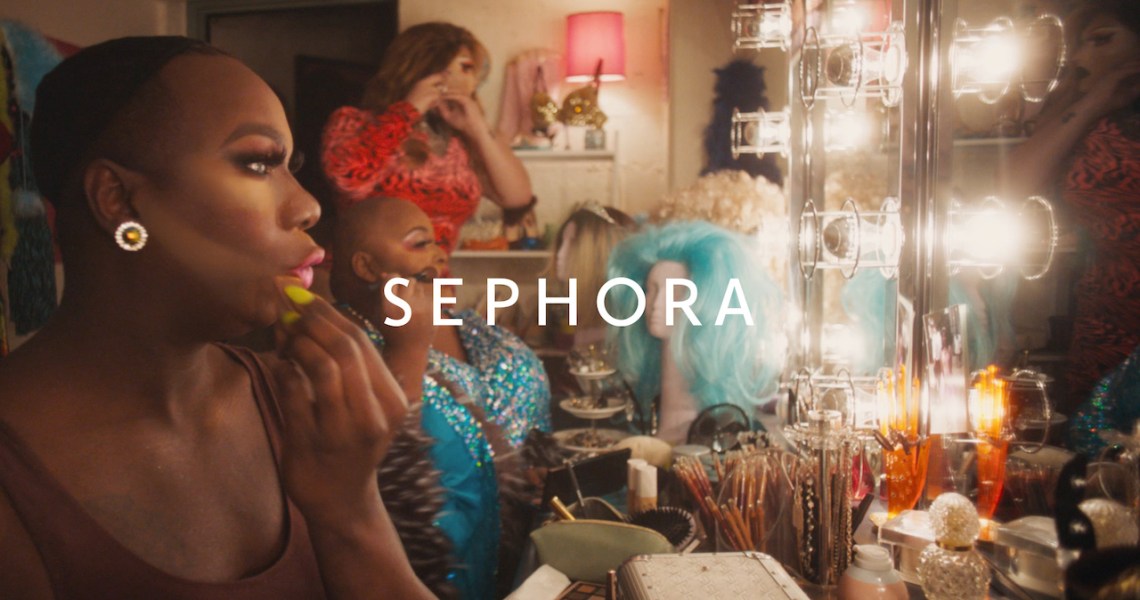On Wednesday, Sephora debuted a new campaign that throws the retailer’s weight and support behind the culture of Black beauty.
Dubbed “Black Beauty is Beauty,” a 60-second ad spot features a compilation of scenes, including a beauty parlor, a drag show dressing room, and a Black mother with her daughter. Overall, it shows show the trends, products and tools in the mainstream beauty sphere and their inherent connection to Black beauty culture. The campaign runs until Nov. 2021, dovetailing at that time with a separate campaign that specifically promotes the Black-owned brands that Sephora sells, like Bread hair care and Topicals skin care.
“When [society] was going through its racial reckoning [in 2020], there was a huge search increase in Black-owned brands and efforts to support Black-owned restaurants or stores, but that has dropped off,” said Abigail Jacobs, Sephora svp of integrated marketing and brand. “At Sephora, we do not want that trend to go down. This [campaign is part of] a long-term commitment to shift the way that we do business, and create a space for Black-owned brands and for diverse customers within the beauty industry.”
Sephora committed to the 15 Percent Pledge on June 10, 2020. The retailer has not set a firm or clear timeline for when it will achieve this goal. Since 2020, Sephora has doubled its Black-owned brand offerings to 16 brands, and it will reach 15% Black-owned brands within the hair category by the end of 2021. As of July 2021, Sephora.com’s total portfolio includes 312 brands, making its Black-owned assortment approximately 5% of its portfolio. In January, Sephora also published a commissioned report on racial bias within retail and reconfigured its annual Sephora Accelerate program to focus on BIPOC-owned brands.
“We are focused on developing, growing and launching the best brands of the future. It’s about building a pipeline for these brands to be successful in the beauty space,” said Jacobs. “We shifted the focus of our Sephora Accelerate and had eight [BIPOC] participating brands in that program this past year, and all of those brands will launch at Sephora.”
Though “Black Beauty is Beauty” is a first, and major, moment for Sephora, it is not the first time in recent history that a player in the beauty industry has sought to recognize and reclaim the role Black people have played in beauty and culture. Just last October, Shea Moisture ran a digital, in-store and TV spot campaign called “It Comes Naturally” that celebrated Black culture and heritage. Separately, Sephora is also not the only beauty retailer that is promoting its role as a home for Black-owned brands. JC Penney, which has worked with Sephora since 2006 via a shop-in-shop partnership that will end by 2023, announced on July 20 that it will work with BIPOC-focused e-commerce retailer Thirteen Lune for its revamped in-store beauty concept. Those shop-in-shops will begin to appear in early 2022. Ulta Beauty announced in February that it will also invest more than $4 million in 2021 toward marketing that fuels the growth of Black-owned brands.
“Black Beauty has often been thought more so as a visual aesthetic, or something exclusively by and for Black people, versus a massively trendsetting culture with a rich history of ingenuity that we are all participants in,” said Shannon Washington, svp and executive creative director at marketing agency R/GA which helped develop the campaign. “There is a rich culture that we want to honor and recognize.”
Ad position: web_incontent_pos1
The campaign strategy will be across TV networks and digital channels like BET, OWN Hulu, HBO Max and YouTube; branded content and podcast advertising through Vox and New York Magazine’s The Cut; and digital ads across social media networks. Jacobs said that the success of the campaign is based on the “number of conversations” it generates across social media.




